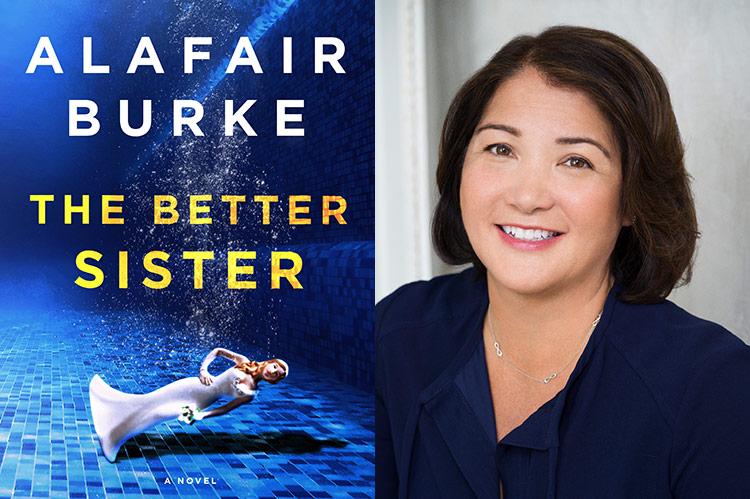“The Better Sister”
Alafair Burke
Harper, $26.99
While you might be hard pressed to call “The Better Sister” thrilling, exactly — first it must lift the lid, spill the beans, rattle skeletons in the closet, and so on — it is entertaining and well worth reading.
Alafair Burke, the novel’s talented domestic-noir author, writes in her author’s note that this installment, together with her earlier books “The Ex” and “The Wife,” completes “a thematic trilogy of novels that explore the complexities of female relationships and the diverse roles that women play in contemporary society.”
Perhaps. But, put more simply, “The Better Sister” is about sibling rivalry and the dark underbelly of family life.
Chloe Taylor, the novel’s narrator, is the younger of two sisters. Always the overachiever, she was an honor roll student and Ivy League graduate. A couple of decades later, she is rich, successful, and an award-winning journalist in Manhattan, basking in the success of her hashtag crusade, called “Them Too,” which she launched to help expose stories of “everyday” women suffering sexual abuse in the workplace, as an extension of the “Me Too” campaign, which she felt was “confined to high-profile, celebrity-driven workplaces.”
Chloe also happens to be married to Adam, the ex-husband of her estranged and reckless sister, Nicky, and has helped raise their son, Ethan, as her own. Then Adam is murdered in the family’s East Hampton home, and when two Suffolk County detectives, Bowen and Guidry, begin their investigation, 16-year-old Ethan, whose alibi doesn’t hold up, falls under suspicion.
“We’ll need to call his mother,” Bowen tells Chloe, who can feel her face going from “fatigue to offense and finally to realization.”
“The police needed to call Ethan’s mother. My husband, Adam, was dead, and now his son — my son, or so it had seemed for nearly a decade — would need his mother.”
And with that, Nicky walks back into Chloe’s life.
Rather like Elena Ferrante’s “My Brilliant Friend,” whereby it is unclear which of the two Neapolitan female friends is really the brilliant one, here, too, the story demands that the reader rethink which sister qualifies as “better.” The siblings’ history of growing up in Cleveland is dark — an abusive alcoholic father and a weak submissive mother — and so twisty that it slows down the pace considerably, making the first third of the book less of a murder mystery and more of a family drama.
Besides Adam’s death, the first 100 pages or so are dedicated to setting up Chloe’s fairy-tale success story (too much of a giveaway that something is off), the siblings’ opposing trajectories as they mature, how ne’er-do-well Nicky managed to snag local up-and-coming attorney Adam, who “could be out with models every night” (surely, no feminist would ever describe her man in those terms), and his subsequent marriage to the other sister. It’s complicated and circumlocutory.
But when a clean-and-sober Nicky arrives in person around page 105, things finally pick up.
Storytellers have long known that there is no narrative so powerful as the warring family. From Greek mythology, awash with dysfunctional families, to Cain and Abel in the Old Testament, to endless fairy tales that delight in wicked stepmothers and evil sisters, toxic families in fiction go back as far as the art of storytelling itself. The complex knots of love and rivalry that bind sisters and brothers provide perfect plots because family is the one thing we all have in common. And tales of dysfunctional families reassure us that ours is not the only one fraught with tensions, conflicts, rifts, and rivalries.
For a psychological suspense writer, this is pretty irresistible stuff, and Alafair Burke mines this landscape well, as the two sisters, once divided, find a way to unite and save the son they both love.
“For the next two and a half weeks, the drive between the courthouse in Riverhead and the house in East Hampton became our shared commute. I tended to drive in the mornings, while Nicky took the wheel on the way home. After a few rounds of arguing about the radio, we adopted the rule that whoever drove controlled the satellite stations. I tended to go for news, light rock, and the ’90s hip-hop channel. She opted for metal, ’80s new wave, and Howard Stern. I had to admit that I ended up liking everything except the metal.”
In Ms. Burke’s adept hands, a Russian doll narrative is set up, with manipulation within manipulation, though it must be said, she unnecessarily portrays every male character in the book as pretty despicable. Even the internet trolls who stalk her feminist campaigns appear as evil Trumpian characters who end their online tirades with posts like “Lock! Her! Up!”
The final third of the story takes place in the courtroom, and since Ms. Burke is a former prosecutor and currently teaches criminal law in Manhattan, she has clearly lived through enough courtroom dramas to make this section very believable and command a comprehensive grip on the reader’s attention. There’s a genuine gallop to the denouement, although the morally dubious climax raises more questions than it answers.
Nonetheless, it’s easy to see why readers keep coming back for this author’s thrills.
Alafair Burke lives in Manhattan and East Hampton.

